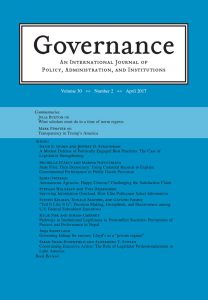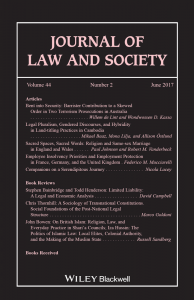Put to the test: For a new sociology of testing
by Noortje Marres and David Stark, Centre for Interdisciplinary Methodologies, University of Warwick · Published · Updated

A test can be defined as an orchestrated attempt to reveal an entity’s potentially unknown properties or capacities. A drug trial, a pregnancy test, and a planetary probe are all procedures designed to ascertain the properties of some entity. However, while tests and testing are well‐established social forms, their role in culture, economy, politics, and everyday life seems to be expanding. With smart city experimentation, randomized controlled trials in economic development, and apps to test your personality and the performance of your social networks, the protocols, grammars, and logics of testing are becoming increasingly prominent as ways of intervening in society. In an age defined by computational innovation, testing seems to have become ubiquitous, as tests are routinely deployed as a form of governance, a marketing device, an instrument for political intervention, and an everyday practice to evaluate the self.
As the role of tests is expanding in culture, the economy, politics, and everyday life today, this special issue asks: What are the social and political consequences of increasingly ubiquitous testing in environments in society? What are its implications for relations between innovation, public politics, and everyday life? And what remains of the potential for experimentation as an emancipatory form? These are among the questions addressed in this special issue of The British Journal of Sociology in which sociologists, anthropologists, and other social scientists put testing to the test.
The lead essay by Noortje Marres and David Stark offers a programmatic statement for a new sociology of testing.
Luciana Leao’s critical examination of randomized control trials in the field of economic development opens up a perspective on testing in society by showing that it is not only the change in location—not the lab, but the field—that makes a significant difference. Rather it is a change in the object of testing in the conduct of tests in society that must be worked through in terms of its consequences.
The article by Joan Robinson on pregnancy testing shows that taking a pregnancy test does not just test a woman’s body, it equally puts at stake her moral attributes/capacities: is she able to take responsibility, is she capable of behaving like an adult? Robinson shows that it is the socio‐material practices involved in taking this once‐defined‐as‐medical test—from purchasing it over the counter in a supermarket, to the decision to take the test at home or in a public toilet—that are critical to its generative capacities.
Drawing on her extraordinary ethnographic work embedded in the scientific team of a NASA planetary probe, Janet Vertesi demonstrates that testing planets does double duty as tests of organizations. The theoretical backdrop to her analysis is the concept of “experimenter’s regress” in laboratory testing, well established in Science & Technology Studies. In contrast to the relatively stable institutional context of such prior accounts, Vertesi encounters institutional and organizational uncertainty, leading her to develop the concept of “institutional regress,” a previously neglected aspect in the sociology of testing.
The paper by Jonathan Bach on the social credit system in China is the first of three contributions in this special issue to explicitly treat testing as a device of governance. Bach shows how the creation of the social credit system entailed the creation of testing environments in society (marked by dynamics of continuous/ubiquitous feedback and intervention) and thus the ubiquitous possibility for all subjects all the time of being experimentally represented and intervened upon.
Martin Tironi is similarly concerned with the deployment of testing in society as an instrument of experimental governance, namely the orchestration of a design experiment in the streets of Santiago de Chile, called “shared streets for a low‐carbon district,” as part of a wider program advocating the transition to sustainable mobility in the city. Tironi shows how this test was rendered doubly experimental, as it produced effects that were not anticipated by its organizers, inviting—if not altogether compelling them—to reconsider the assumptions that guided the tests’ design and implementation.
Nathan Coombs’ analysis of stress testing of UK financial institutions provides an exciting alternative perspective on what renders these tests experimental. Reflecting on the sharp reduction in institutions failing the financial stress tests orchestrated by the UK’s Financial Authority (FA), Coombs proposes to expand our understanding of what is put to the test in these evaluative exercises. Rather than evaluating the efficacy of stress testing retroactively, in terms of its ability to predict a financial calamity that is still in the future, Coombs proposes to evaluate these in terms of whether they enable the FA to undertake supervisory actions that would not otherwise have been possible.
Noortje Marres’ article on street trials of intelligent vehicles considers the extent to which sociological propositions—formulated in the sociology of testing and the sociology of artificial intelligence—are put to the test in these engineering‐led tests conducted on the “open road” in three UK cities, London, Coventry, and Milton Keynes. She argues that while these tests are designed to evaluate the performance of individual entities—vehicles, road users—they equally have the capacity to put society to the test.
Our special issue concludes with two papers bearing on identity. The first, by Willem Schinkel, analyzes the identities of citizenship. Subjects become citizens, Schinkel demonstrates, along a trajectory of testing practices choreographed by immigation agencies and other agents of the state. Developing a theme that is woven throughout this special issue, he points to social and political practices that operate as tests without being explicitly conceived as such.
Giovanni Formilan and David Stark analyze how artistic identity is a process of ongoing testing by studying the use of aliases among electronic music artists. They show how name‐altering practices—varying arrangements of pseudonymity (different names), polyonymy (multiple names), and anonymity (no name, no face)—not only put the artist to the test but also probe the values and audiences that populate this underground music scene.
This Preface to the Special Issue, Put to the test: For a new sociology of testing, edited by professors Noortje Marres and David Stark is published as Volume 71 issue 3 of The British Journal of Sociology, April 2020.






1468-0491/asset/society_affiliation_image.gif?v=1&s=859caf337f44d9bf73120debe8a7ad67751a0209)
